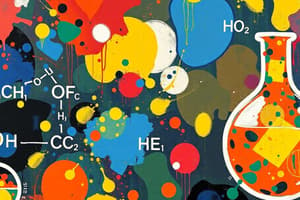Podcast
Questions and Answers
What is the difference between the gypsum and Paris?
What is the difference between the gypsum and Paris?
- Gypsum is a naturally occurring mineral, while Paris is a synthetic compound. (correct)
- Gypsum is used in construction, while Paris is used in art.
- They have different chemical formulas. Gypsum has the formula CaSO⁄2H⁄2O, while Paris has the formula CaSO4. 
- Gypsum is a chemical compound, while Paris is a mixture of other chemicals.
How can you make a Plaster of Paris?
How can you make a Plaster of Paris?
Plaster of Paris is produced when Gypsum is heated to a temperature of 150 degrees Celcius and then powdered.
What is the chemical formula for Plaster of Paris?
What is the chemical formula for Plaster of Paris?
CaSO4.1/2H2O
Flashcards
Gypsum
Gypsum
A mineral composed of calcium sulfate dihydrate (CaSO₄·2H₂O), used in construction.
Plaster of Paris
Plaster of Paris
A white powder made by heating gypsum (CaSO₄·2H₂O) to remove some water, forming calcium sulfate hemihydrate (CaSO₄·½H₂O). It is used for plastering and sculptures.
How to detect CO₂
How to detect CO₂
A solution of calcium hydroxide (Ca(OH)₂) turns milky white when exposed to carbon dioxide (CO₂), forming a precipitate of calcium carbonate (CaCO₃).
Sodium
Sodium
Signup and view all the flashcards
Sodium's reactivity
Sodium's reactivity
Signup and view all the flashcards
Sodium in mining
Sodium in mining
Signup and view all the flashcards
Flame test for sodium
Flame test for sodium
Signup and view all the flashcards
Sodium chloride: table salt
Sodium chloride: table salt
Signup and view all the flashcards
Pure sodium chloride
Pure sodium chloride
Signup and view all the flashcards
Impure sodium chloride
Impure sodium chloride
Signup and view all the flashcards
Uses of sodium chloride
Uses of sodium chloride
Signup and view all the flashcards
Alkali metals
Alkali metals
Signup and view all the flashcards
Alkaline earth metals
Alkaline earth metals
Signup and view all the flashcards
Properties of alkali metals
Properties of alkali metals
Signup and view all the flashcards
Properties of alkaline earth metals
Properties of alkaline earth metals
Signup and view all the flashcards
Flame test for lithium
Flame test for lithium
Signup and view all the flashcards
Flame test for sodium
Flame test for sodium
Signup and view all the flashcards
Flame test for calcium
Flame test for calcium
Signup and view all the flashcards
Flame test for strontium
Flame test for strontium
Signup and view all the flashcards
Flame test for barium
Flame test for barium
Signup and view all the flashcards
Why are Group 1 and 2 elements good reducing agents?
Why are Group 1 and 2 elements good reducing agents?
Signup and view all the flashcards
Sodium's electron configuration
Sodium's electron configuration
Signup and view all the flashcards
Sodium's reactivity with air
Sodium's reactivity with air
Signup and view all the flashcards
Sodium's reaction with chlorine
Sodium's reaction with chlorine
Signup and view all the flashcards
Sodium's reaction with water
Sodium's reaction with water
Signup and view all the flashcards
Sodium hydroxide (NaOH)
Sodium hydroxide (NaOH)
Signup and view all the flashcards
Calcium (Ca)
Calcium (Ca)
Signup and view all the flashcards
Calcium compounds
Calcium compounds
Signup and view all the flashcards
Slaking of lime
Slaking of lime
Signup and view all the flashcards
Study Notes
Chemical Reactions
- Chemical reactions involve the rearrangement of atoms to form new substances.
- Reactants are the substances that undergo change.
- Products are the new substances formed.
- Chemical equations represent reactions, with reactants on the left and products on the right, separated by an arrow.
- The Law of Conservation of Mass applies, meaning the number of atoms of each element is the same on both sides of the equation. This is balanced.
Examples of Chemical Reactions
-
Calcium hydroxide (Ca(OH)₂) reacts with carbon dioxide (CO₂) to produce calcium carbonate (CaCO₃) and water (H₂O). Ca(OH)₂ + CO₂ → CaCO₃ + H₂O
-
Calcium sulfate dihydrate (CaSO₄·2H₂O) is a chemical compound.
Studying That Suits You
Use AI to generate personalized quizzes and flashcards to suit your learning preferences.




